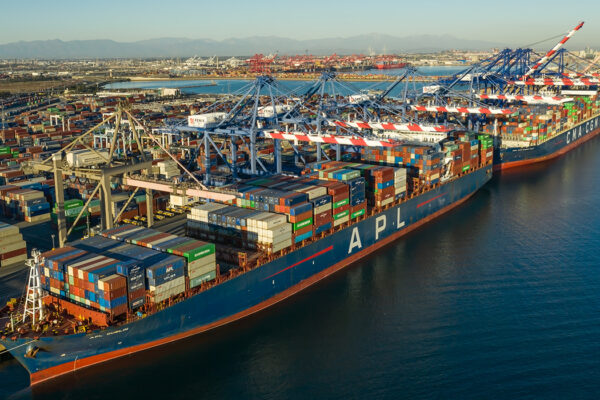The devastating collapse of the Francis Scott Key Bridge in Baltimore will add another wrinkle to recent global supply chain troubles, according to Panos Kouvelis, the Emerson Distinguished Professor of Supply Chain, Operations and Technology at Olin Business School at Washington University in St. Louis.
“In recent years, the life of supply chain and logistics managers has been fraught on an almost daily basis by news of unexpected incidents that create disruptions, increase supply chain risks and require immediate and expensive mitigating actions,” said Kouvelis, who also serves as director of The Boeing Center for Supply Chain Innovation at Olin.

“For example, Houthi attacks in the Red Sea have prevented passage through the Suez Canal, causing shipping companies, like Maersk, to reroute container ships via the southernmost point of Africa, the Cape of Good Hope. This indirect route adds at least 10 extra days and millions in extra costs for ships to reach European and some eastern U.S. ports. In the same region, Somali pirates reappeared recently to make shipping through the Indian Ocean treacherous — and insurance rates expensive — for those brave enough to sail in the region.
“Weather-related events have also wreaked havoc on the global supply chain. For example, recent drought has lowered water levels in lakes supporting the Panama Canal. As a result, the canal’s capacity has been reduced by almost one-third of vessels routed through it to reach the North America eastern ports. Vessels that get rerouted often must go through western ports to bring their goods to the American market,” he said.
In the U.S., these global events have had the biggest impact on eastern ports. The temporary loss of the Baltimore port — one of the top 10 U.S. ports in trade volume — is another wrinkle for supply chain managers to think about, Kouvelis said.
According to Kouvelis, the Baltimore port is extremely important for certain “roll-on/roll-off” products — commonly referred to as “ro-ro” loads — that include autos, trucks, tractors and wheeled cranes, as well as farm and construction equipment. On the commodity side, coal, liquefied natural gas, coffee and sugar frequent it as either imports or, most frequently, exports, he said.
‘While the first few weeks the eastern ports might be the recipients in shipping companies’ rerouting of loads, the western ports are ramping up their operations and are trying to attract more shipping volume.’
Panos Kouvelis
The timing of the March 26 disaster — right before the Easter weekend and a busy spring and summer season — will result in immediate rerouting actions that will have shipments going to New York, New Jersey and Norfolk, Va., ports. In the short term, Kouvelis said the extra volume at these eastern ports will be manageable. However, this event could be a catalyst for western ports to attract new loads.
“While the first few weeks these other eastern ports might be the recipients in shipping companies’ rerouting of loads, the western ports are ramping up their operations and are trying to attract more shipping volume,” Kouvelis said.
“For some products, these western destinations might end up being more attractive — in particular if they are coming from the Pacific, have mostly commodity loads and they have used Panama Canal to cross to the Atlantic side.”
In the short term, companies with significant warehousing and logistics operations around the Baltimore port that heavily rely on it as the hub of their activities will bear the brunt of the Baltimore port closure, Kouvelis said. This includes car importers such as BMW and Volkswagen and logistics companies including Amazon and FedEx using the port to serve the nearby region. Companies bringing in raw commodities like oil and sugar headed to nearby refineries also will be impacted.
“The unexpected closure of the Baltimore port will definitely be a headache for logistics managers,” Kouvelis said. “Supply chains have survived worse, and we already paid higher prices. There might be some delay in a shipment or two, but nothing much to add to the current inflation.”


